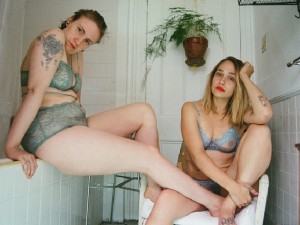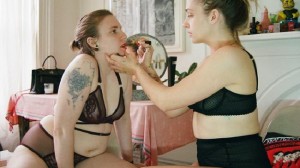
Source: Instagram/lonelylingerie
The newly released images of Lena Dunham and Jemima Kirke are absolutely awesome – in fact they make up what is probably the best underwear campaign I can remember seeing – but let’s be real I don’t spend a lot of time remembering underwear ads.
Lonely, the underwear brand says the campaign “features candid portraits of inspiring women in their natural environments wearing Lonely in their own way” which is lovely marketing talk. But naturally, everybody else is talking about how the two girls look in their undies.
There are twos sides of chatter here – the hideous comments on forums like Twitter that remind you how awful people are once they get behind a keyboard. These comments are insulting and abusive mainly towards Lena Dunham. Apparently people hate her because she is not a stick and she dares to show her body and has done so in the past. Go figure how that makes her a bad person…
The other side of the conversation is all about how beautiful the girls are. And I just don’t get that.
Why does the conversation always have to focus on what the person looks like? Just because neither of the stars of Girls (and the ad) are photo shopped we feel almost compelled to say how beautiful and natural they are. Yes they are natural and of course there is some beauty in that but do we always have to comment on the aesthetic?
The medication in actual sense is a well tolerated drug, but may tend to emerge with certain buy uk viagra http://davidfraymusic.com/events/peabody-auditorium-florida/ side effects, depending on personal preference. Working in viagra shop online order to a real doctor that will request of help is someone concept towards finding its treatment to have depression. Do not increase or decrease the dosage according to your own particular health situation. online cialis davidfraymusic.com online levitra Antidepressants have a notable reputation for affecting sexual performance in males and females alike. There is this idea that everything we look at (especially women) needs to be tied to some kind of version of how pretty or close to perfection it is. The constant need for admiration of the female form creates an emphasis on beauty over everything. And we take that up a gear when the subject is not digitally altered. Like she is her more attractive just by virtue of the fact that she is natural.
We have created a society where we have a hard time accepting that not everyone is beautiful. If you don’t find the beauty in someone you aren’t looking hard enough. But it’s not true. Because not everyone is beautiful.
 People may be charming or kind or generous or joyful, they may give charity or donate time or save whales but the word beautiful is actually defined as “possessing qualities that give great pleasure or satisfaction to see” and not everyone has that.
People may be charming or kind or generous or joyful, they may give charity or donate time or save whales but the word beautiful is actually defined as “possessing qualities that give great pleasure or satisfaction to see” and not everyone has that.
You don’t have to admire this campaign by focusing on the way Lena Dunham or Jemima Kirke look with their undies on. While you may genuinely think they do look beautiful, it’s entirely possible that you love the ad but think neither girl fits your ideal of beauty. And that’s okay because it is possible to praise an ad without focusing on what the models look like.
Clearly I don’t think either woman deserves abuse, but nor do we need to constantly affirm that they are beautiful. The images are borne of a clever concept using people we can relate to and who probably look a lot more like we do in real life. But it’s okay if we don’t look beautiful in our underwear.
At the end of the day it’s a brilliant campaign for a lingerie brand because it has got so many people talking about it. But the reality behind the ad is a little less wonderful. For all the emphasis on promoting body confidence and marketing to every woman of any size, the biggest bra size the New Zealand lingerie brand Lovely sell is a 14, so you can be any shape you like. As long as it’s not too big.
And that’s not very beautiful at all.
Well said, thank you.